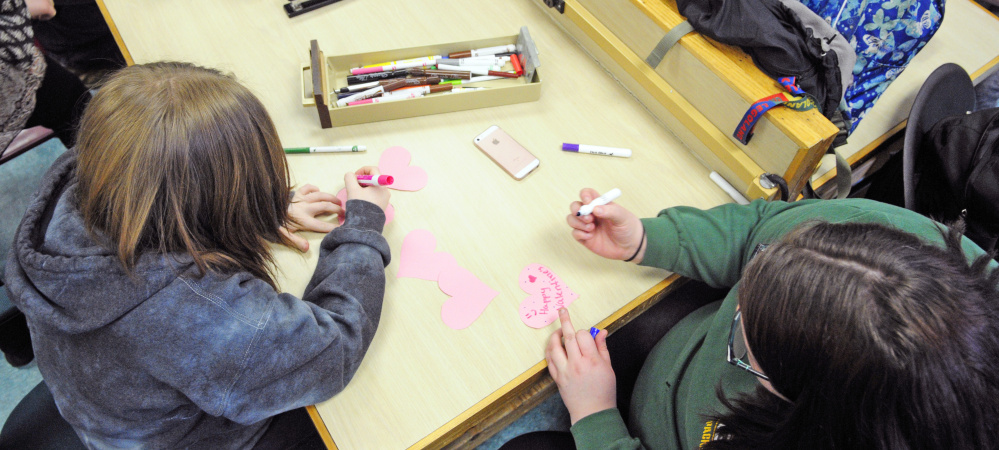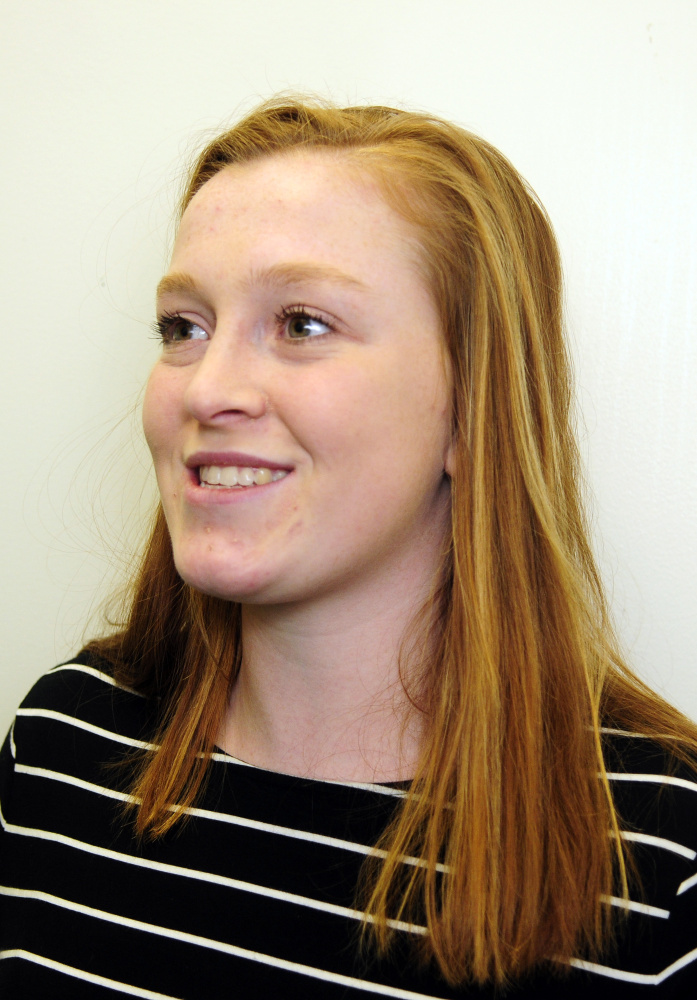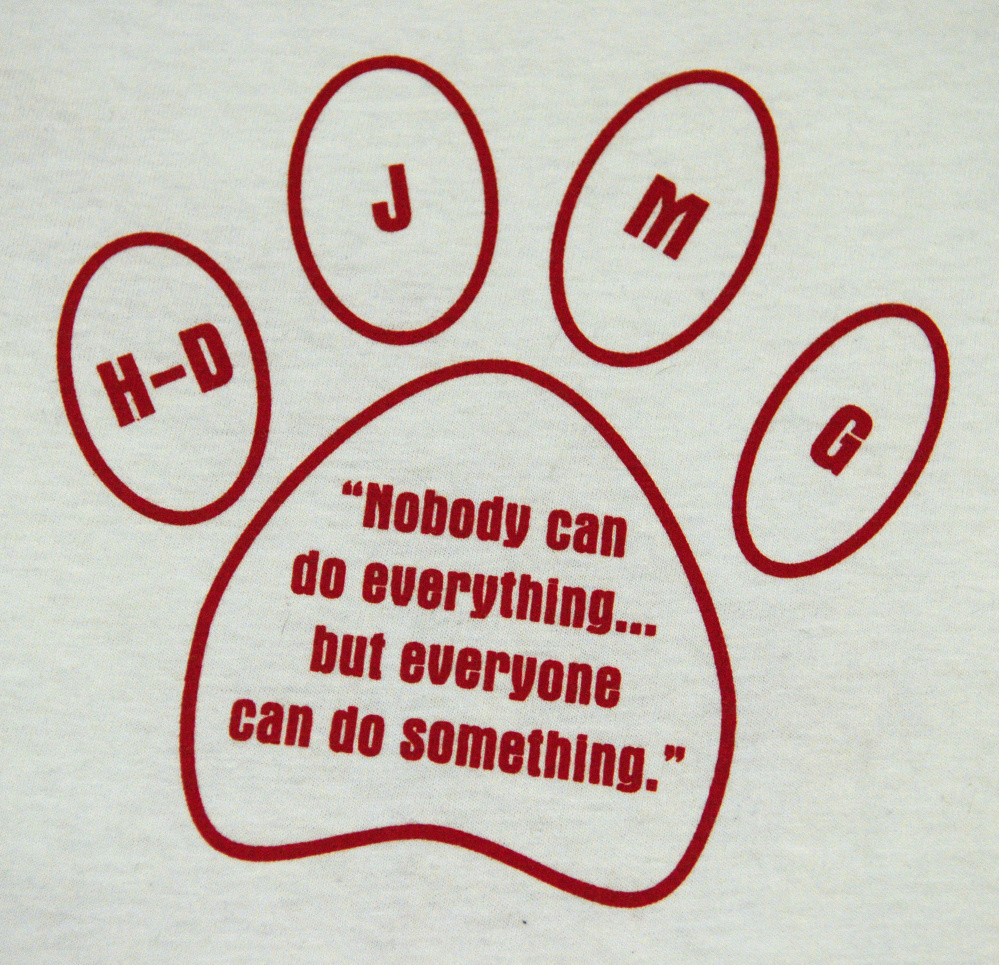FARMINGDALE — Sierra Proulx said enrolling in the Jobs for Maine Graduates program at Hall-Dale High School is the greatest thing that’s happened in her high school career.
Proulx, 17, said she’s learned much from her instructor, Jeremy Porter — including life skills, job skills and things she’ll need to know after graduating high school in June. The program also has changed her as a person.
“I’ve become the person I am because of JMG,” she said. “I’ve developed job skills and things I’m going to need after high school.”
Porter said he’s seen Proulx grow because of the program.
“She was quiet and shy, and I don’t even know if I knew what her voice sounded like when she was a freshman,” Porter said. “Now she’s the president of our organization, she’s in the National Honor Society, and she plays field hockey. She’s made phenomenal growth as a person.”
JGM, or Jobs for Maine Graduates, is a 22-year-old public-private partnership that serves more than 6,500 students a year and helps provide them with the skills and motivation they need to succeed. Last year in the Kennebec Valley, 660 students in nine schools performed 3,200 hours of community service and raised $12,000 for nonprofit organizations in their communities.
The organization, based in Augusta, received the 2017 Community Service award from the Kennebec Valley Chamber of Commerce at the annual Kenney Awards last month.
“This program is designed to help students who face barriers to education, be it from their home life, economic status, social skills, maturity, health and more,” Porter said. “If you can think of it, we’ve probably dealt with it.”
Porter, in his fourth year as the JMG specialist at Hall-Dale High School, has 60 students who see him for an hour per day a couple of times per week. They work on team building, problem solving, confidence building, resume writing, financial literacy and more.
“We try to cover as much as we can, because most students aren’t getting these things in the school environment,” he said.
In addition to regular classroom work, JMG students around the state — there are 91 programs in Maine — participate in community service projects to learn the importance of giving back.
At Hall-Dale, the students’ big event is hosting the Kennebec County Special Olympics, which happens May 10 this year. Porter said the students plan it, organize it, decorate and learn how to be timers and measurers.
“They do the whole thing,” he said. “They get to work with others who have disabilities, and they love to do it because they know they’re doing something good for someone else.”
Junior Sabrina Freeman, 16, said she learned about the JMG program her freshman year while volunteering with the Special Olympics event. She met Porter that afternoon and decided to join the program at the beginning of her sophomore year.
“It’s helped me learn better leadership and helped me become a better leader,” said Freeman, who is a captain on the school’s soccer and basketball teams. “People see me as a leader, and I act like a captain and leader instead of just being called one.”
Proulx said helping with Special Olympics is special because she likes giving back to the community. She plans to continue her service to the community when she goes to St. Joseph’s College in Standish next year to study early childhood education.
“My parents never went to college, so without Mr. Porter and JMG, I wouldn’t have known where to begin,” she said.
Porter, who has a degree in chemical engineering from the University of Maine and didn’t start teaching until about six years ago, said it was a learning experience when he first started in education.
“The things teenagers were going through was an eye-opener,” he said. “I didn’t realize so many kids were having so many issues.”
The JMG program, he said, helps students deal with a lot of problems they may be having either at home or at school.
“We focus a lot on decision making and making goal-oriented decisions that will affect their futures,” Porter said. “We do a lot of that stuff because too many kids just don’t see that connection.”
While the program’s ultimate success would be making itself unnecessary, Porter said. it is growing and more sites continue to be added around the state. He conceded that for all the program’s successes, there are some students that “just don’t make it.”
“It’s a slippery slope, because there is a growing need, but we want the need to go away,” Porter said. “I don’t know if we’ll ever get there.”
Jason Pafundi — 621-5663
Twitter: @jasonpafundiKJ
Send questions/comments to the editors.







Comments are no longer available on this story